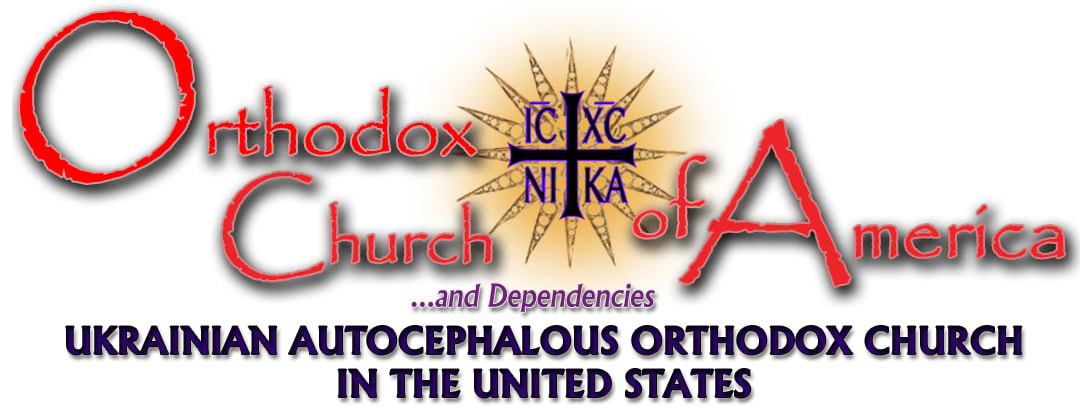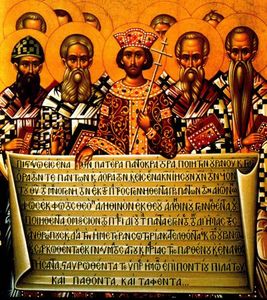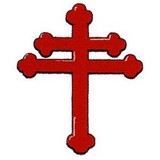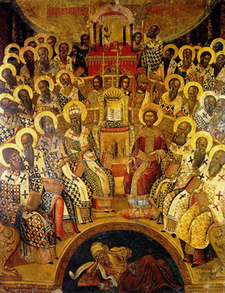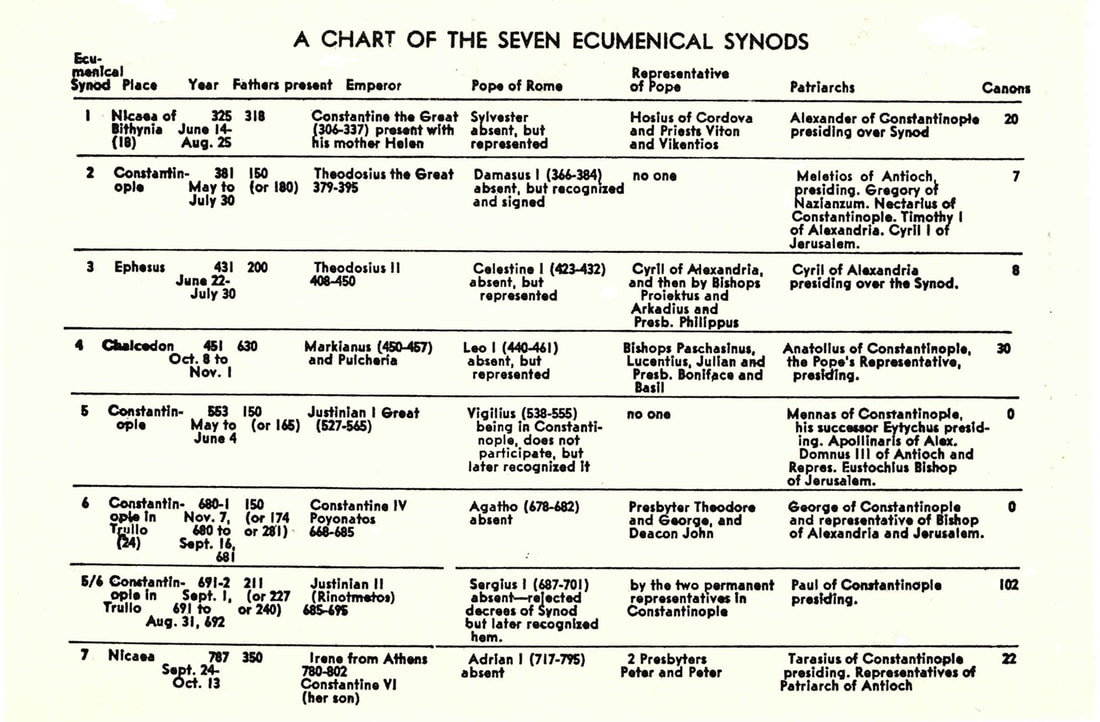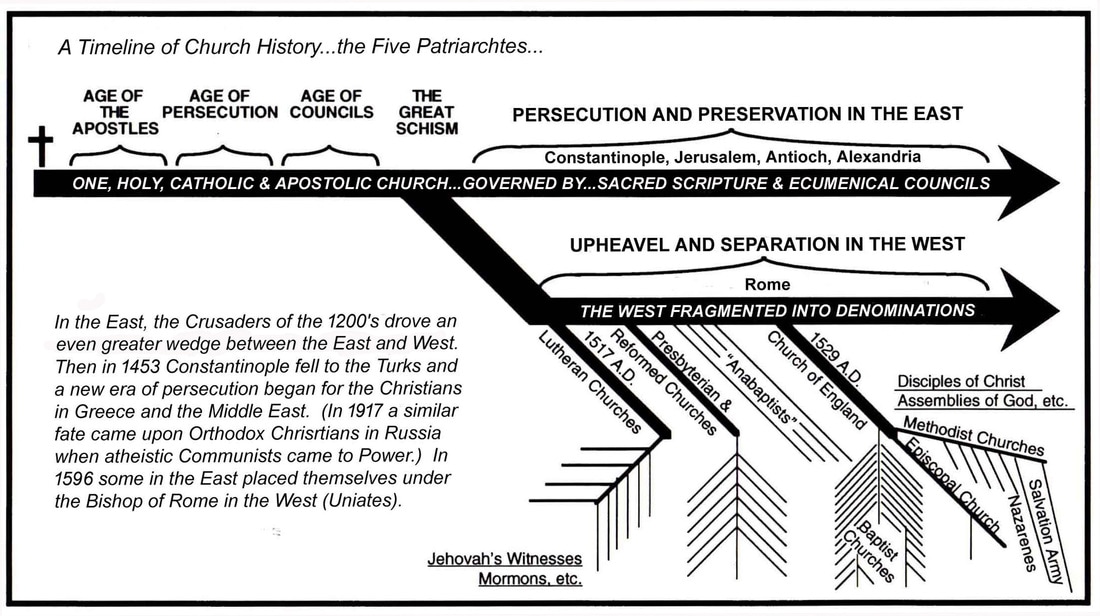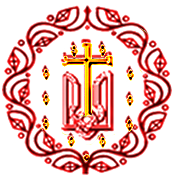The Nicene Creed - The "Symbol of Faith"
The clearest and most concise explanation of the Orthodox Faith can be found in the ancient Nicene-Constantinopolitan Creed, formally drawn up at the first ecumenical council in Nicea (325) and at the second ecumenical council in Constantinople (381).
The word "creed" comes from the Latin word credo, which means "I believe." In the Orthodox Church the creed is usually called The Symbol of Faith, which means literally the “bringing together”, and the "expression" or "confession" of the faith. This Creed, always recited at Baptism and at every celebration of the Divine Liturgy (the Holy Eucharist), is the official expression of the common and inherited Faith that joins the Orthodox Church of America - Ukrainian Autocephalous Orthodox Church in the United States to every other Orthodox Christian jurisdiction throughout the world and throughout history.
The word "creed" comes from the Latin word credo, which means "I believe." In the Orthodox Church the creed is usually called The Symbol of Faith, which means literally the “bringing together”, and the "expression" or "confession" of the faith. This Creed, always recited at Baptism and at every celebration of the Divine Liturgy (the Holy Eucharist), is the official expression of the common and inherited Faith that joins the Orthodox Church of America - Ukrainian Autocephalous Orthodox Church in the United States to every other Orthodox Christian jurisdiction throughout the world and throughout history.
There can be no alteration or change to the Holy Creed!!!
Adding any words is CONTRARY to the Seven Ecumenical Councils
By changing the "Symbol of Faith" it...IN FACT...creates a "new creed"
...for a new Faith...a different Faith...a new Religion!
Adding any words is CONTRARY to the Seven Ecumenical Councils
By changing the "Symbol of Faith" it...IN FACT...creates a "new creed"
...for a new Faith...a different Faith...a new Religion!
Based on our profession of the "unaltered" Creed of the Ecumenical Councils, validity of Apostolic Succession and True Presence in the Holy Eucharist, our Blessed Jurisdiction is in full communion with all the Orthodox Christian congregations and bishoprics throughout the world, including those in Greece, Russia, Albania, Romania, Serbia, Cyprus, Bulgaria, Indonesia, Africa, Latin America, China, Japan, United States and the Middle East.
I believe in one God, the Father Almighty, Maker of heaven and earth, and of all things visible and invisible;
And in one Lord, Jesus Christ, the Son of God, the Only-begotten, Begotten of the Father before all worlds, Light of Light, Very God of Very God, Begotten, not made, of one essence with the Father, by Whom all things were made:
Who for us men and for our salvation came down from heaven, and was incarnate of the Holy Spirit and the Virgin Mary, and was made man;
And was crucified also for us under Pontius Pilate, and suffered and was buried;
And the third day He rose again, according to the Scriptures;
And ascended into heaven, and sitteth at the right hand of the Father;
And He shall come again with glory to judge the quick and the dead, Whose kingdom shall have no end.
And I believe in the Holy Spirit, the Lord, and Giver of Life, Who proceedeth from the Father, Who with the Father and the Son together is worshipped and glorified, Who spoke by the Prophets;
And I believe in One, Holy, Catholic and Apostolic Church.
I acknowledge one Baptism for the remission of sins.
I look for the Resurrection of the dead,
And the Life of the age to come. Amen.
And in one Lord, Jesus Christ, the Son of God, the Only-begotten, Begotten of the Father before all worlds, Light of Light, Very God of Very God, Begotten, not made, of one essence with the Father, by Whom all things were made:
Who for us men and for our salvation came down from heaven, and was incarnate of the Holy Spirit and the Virgin Mary, and was made man;
And was crucified also for us under Pontius Pilate, and suffered and was buried;
And the third day He rose again, according to the Scriptures;
And ascended into heaven, and sitteth at the right hand of the Father;
And He shall come again with glory to judge the quick and the dead, Whose kingdom shall have no end.
And I believe in the Holy Spirit, the Lord, and Giver of Life, Who proceedeth from the Father, Who with the Father and the Son together is worshipped and glorified, Who spoke by the Prophets;
And I believe in One, Holy, Catholic and Apostolic Church.
I acknowledge one Baptism for the remission of sins.
I look for the Resurrection of the dead,
And the Life of the age to come. Amen.
"...Thus, having in mind and declaring all these things,
we embrace with mind and tongue and declare to all people with a loud voice
the Horos (Rule) of the most pure faith of the Christians
which has come down to us from above through the Fathers,
subtracting nothing, adding nothing, falsifying nothing..."
"...all the participating Bishops understood
that this was meant to be a condemnation
of the 'Filioque' addition to the Creed."
we embrace with mind and tongue and declare to all people with a loud voice
the Horos (Rule) of the most pure faith of the Christians
which has come down to us from above through the Fathers,
subtracting nothing, adding nothing, falsifying nothing..."
"...all the participating Bishops understood
that this was meant to be a condemnation
of the 'Filioque' addition to the Creed."
CONFESSION OF FAITH BY THE APC HOLY SYNOD
(Moscow - 7 September 2008)
(Moscow - 7 September 2008)
1. We believe in one God, the Trinity: Father, Son and Holy Spirit.
2. We believe in God the Father Almighty, Creator of heaven and earth, of all things visible and invisible whole.
3. We believe in our Lord Jesus Christ - the Son of God and Savior of the world, who took upon Himself our sins, crucified, risen and coming.
4. We believe in the Holy Spirit, the Lord's life-giving, worshiped and glorified with the Father and the Son, and renew the face of the earth acting in the Church of Christ.
5. In their faith rely on the Holy Scriptures (all books of the Old and New Testaments) and Holy Tradition (the teaching of the Apostles, Seven Holy Ecumenical and Local Councils, the Church Fathers).
6. Fully accept the Apostles' and Nicene-Constantinopolitan Creed.
7. Inviolability keep the tenets of the Seven Holy Ecumenical Councils, but for the sake of the proclamation of the Gospel and the salvation of souls consider it possible to make changes by economia in the church canons and develop the Holy Tradition in strict accordance with the letter and spirit of the Divine Revelation.
8. Equal recognize both Western and Eastern Rites and Christian heritage, the richness of theological thought and liturgical traditions, in fact, what is not contrary to the Orthodox Faith.
9. We believe that through the sin of Adam humanity inherits the damaged nature, but our Lord Jesus Christ by His sacrifice on the cross redeemed the ancestral sin and the sins of humanity, and establishing His Church, calls us to participate in the revival and His resurrection.
10. We believe in One, Holy, Catholic (i.e. universal) and Apostolic Church, manifesting itself in a variety of local Churches and communities, through faith and the sacraments involved the mystery of the death and resurrection of Christ in the Holy Spirit of grace; and dare to consider our Apostolic Orthodox Church, part of the one Church of Christ.
11. We believe that the Church is necessary for salvation, because Christ, the only mediator and the way of salvation, is present among us in his Body which is the Church.
12. We acknowledge that there are seven sacraments of the Church: Baptism, the Eucharist, Confirmation, Penance, Anointing, Holy Orders (Priesthood) and Marriage.
13. We believe in one baptism in the name of the Father and of the Son and of the Holy Spirit, established by our Lord Jesus Christ for the remission of sins.
14. We believe that the Eucharistic Liturgy is a mysterious commission of the Cross of Sacrifice, and under the guise of bread and wine, the faithful partake of the true Body and Blood of our Lord Jesus Christ.
15. Let's respect and ask intercession from all the Saints of God, both Eastern and Western, and especially - the Most Pure and Immaculate Ever-Virgin Mary, Mother of the Incarnate Word, our Lord, God and Savior Jesus Christ.
So help us God, Blessed to keep this Faith. Amen
2. We believe in God the Father Almighty, Creator of heaven and earth, of all things visible and invisible whole.
3. We believe in our Lord Jesus Christ - the Son of God and Savior of the world, who took upon Himself our sins, crucified, risen and coming.
4. We believe in the Holy Spirit, the Lord's life-giving, worshiped and glorified with the Father and the Son, and renew the face of the earth acting in the Church of Christ.
5. In their faith rely on the Holy Scriptures (all books of the Old and New Testaments) and Holy Tradition (the teaching of the Apostles, Seven Holy Ecumenical and Local Councils, the Church Fathers).
6. Fully accept the Apostles' and Nicene-Constantinopolitan Creed.
7. Inviolability keep the tenets of the Seven Holy Ecumenical Councils, but for the sake of the proclamation of the Gospel and the salvation of souls consider it possible to make changes by economia in the church canons and develop the Holy Tradition in strict accordance with the letter and spirit of the Divine Revelation.
8. Equal recognize both Western and Eastern Rites and Christian heritage, the richness of theological thought and liturgical traditions, in fact, what is not contrary to the Orthodox Faith.
9. We believe that through the sin of Adam humanity inherits the damaged nature, but our Lord Jesus Christ by His sacrifice on the cross redeemed the ancestral sin and the sins of humanity, and establishing His Church, calls us to participate in the revival and His resurrection.
10. We believe in One, Holy, Catholic (i.e. universal) and Apostolic Church, manifesting itself in a variety of local Churches and communities, through faith and the sacraments involved the mystery of the death and resurrection of Christ in the Holy Spirit of grace; and dare to consider our Apostolic Orthodox Church, part of the one Church of Christ.
11. We believe that the Church is necessary for salvation, because Christ, the only mediator and the way of salvation, is present among us in his Body which is the Church.
12. We acknowledge that there are seven sacraments of the Church: Baptism, the Eucharist, Confirmation, Penance, Anointing, Holy Orders (Priesthood) and Marriage.
13. We believe in one baptism in the name of the Father and of the Son and of the Holy Spirit, established by our Lord Jesus Christ for the remission of sins.
14. We believe that the Eucharistic Liturgy is a mysterious commission of the Cross of Sacrifice, and under the guise of bread and wine, the faithful partake of the true Body and Blood of our Lord Jesus Christ.
15. Let's respect and ask intercession from all the Saints of God, both Eastern and Western, and especially - the Most Pure and Immaculate Ever-Virgin Mary, Mother of the Incarnate Word, our Lord, God and Savior Jesus Christ.
So help us God, Blessed to keep this Faith. Amen
Church & Authority...What We Must Believe...
The Church is the "Kingdom of God on Earth"...not to be divided...
The Church is "Orthodox in Faith" and "Catholic in Communion"...
"While the bond of concord remains, and the undivided sacrament of the Catholic Church endures, every bishop disposes and directs his own acts, and will have to give an account of his purposes to the Lord." -- St. Cyprian in his Letter to Antonianus
"For neither does any of us set himself up as a bishop of bishops, nor by tyrannical terror does any compel his colleague to the necessity of obedience; since every bishop, according to the allowance of his liberty and power, has his own proper right of judgment, and can no more be judged by another than himself can judge another. But let us all wait for the judgment of our Lord Jesus Christ, who is the only one that has the power both of preferring us in the government of His Church, and of judging us in our conduct there." -- St. Cyprian in his Address to the Seventh Ecumenical Council
"Through the changes of time and successions, the ordering of bishops and the plan of the Church flow onwards; so that the Church is founded upon the bishops, and every act of the Church is controlled by these same rulers. Since this, then, is founded on the Divine Law, I marvel that some, with daring temerity, have chosen to write to me as if they wrote in the name of the Church." -- St. Cyprian to the Lapsed, Epistle XXVI
"...the Councils themselves, which are held in the several districts and provinces, must yield, beyond all possibility of doubt, to the authority of the Plenary (Ecumenical or General) Councils which are formed for the whole Christian world..." -- St. Augustine in his work 'On Baptism, Against the Donatists'
"...which by means of the Apostolic Sees, and the succession of bishops is spread abroad in an indisputably world-wide diffusion." -- St. Augustine in his Letter CCXXXII
"For on this very account the Lord said, 'On this rock I will build my Church,' because Peter had said, 'Thou art the Christ, the Son of the living God.' On this rock, therefore, He said, which thou hast confessed, I will build my Church. For the Rock (petra) was Christ; and on this foundation was Peter himself also built." -- St. Augustine of Hippo in his Tractate CXXIV, 'On the Gospel of John'
"Thou art therefore, saith He, Peter, and upon this Rock which thou hast confessed, upon this rock, which thou hast acknowledged, saying, 'Thou art the Christ, the Son of the living God,' I will build my Church. Upon Me I will build thee, not Me upon thee." -- St. Augustine of Hippo in his Tractate CXXIV, On the Gospel of John'
"Where the bishop is to be seen, there let all his people be; just as wherever Jesus Christ is present, we have the Catholic Church." -- St. Ignatius of Antioch in his Letter to the Smyrnaeans
"It is not the case that there is one church at Rome and another in all the world beside. Gaul and Britain, Africa and Persia, India and the East worship one Christ and observe one rule of truth. If you ask for authority, the world outweighs its capital. Wherever there is a bishop, whether it be at Rome or at Engubium, whether it be Constantinople or at Rhegium, whether it be at Alexandria or at Zoan, his dignity is one and his priesthood is one. Neither the command or wealth nor the lowliness of poverty makes him more a bishop or less a bishop. All alike are Successors of the Apostles." St. Jerome in his Letter CXLVI to Evangelus
The East has always preserved the Cyprianic vision of the Early Church. St. Cyprian forcefully preached that St. Peter's primacy is shared by all the bishops and St. Augustine, Bishop of Hippo & Doctor of the Church in the West, unequivocally stated time & time again that supreme universal jurisdiction of the Church resides in its Ecumenical or General Councils and NOT in a single Apostolic See!
St. Augustine had ample opportunity to express a belief in the supreme jurisdiction of the Roman Patriarchate...but he NEVER did so.
From before the Third Century, the Church in Rome was accepted as "First Among Equals." The "Chair of Peter" was the Undivided Church and not the "See of Rome" by itself.
St. Cyprian clearly taught St. Peter's primacy being perpetuated in ALL the canonical bishops of the Undivided Catholic Church. St. Cyprian's works pointedly exclude the notion of St. Peter's primacy being exercised by a single bishop to the exclusion of others.This form of Church government was the ONLY ONE recognized by the Seven Ecumenical Councils of the Undivided Church, as is preserved by the Eastern Churches today.
It is this "pastoral conversion" of both the present day Papacy & Roman Curia that His Holiness Pope Francis is working to achieve! The Church must profess "Church and Authority" as it was given and inspired by the Holy Spirit to the Undivided Catholic Church at the Seven Ecumenical Councils...without any change or alteration!
+ + + + + This is why we are called, and gloriously part of, the Orthodox or "rightly believing" Early Church of the Seven Ecumenical Councils and, the Western Roman Patriarchate...which was the first to break from the Undivided Early Church...ceased to call themselves Orthodox, because they added various innovations, e.g. the "filioque" clause to the Nicene Creed and use of unleavened bread for the Eucharist.
Sadly, all of this, and much more, caused the original Orthodox Patriarchate of the West to develop doctrines which were farther and farther away from the Truths of the authentic "Deposit of Faith" [given by Our Lord Jesus to the Apostles and completed by the Holy Spirit, starting on that first Pentecost and completed during the course of the Seven Ecumenical Councils] and eventually resulting in a complete protesting against the Church of Rome - changing revealed Truths and adding innovations - causing more division in the Body of Christ with the Protestant Reformation!
A Simple Explanation of the Orthodox Faith
What is the Orthodox Church? The Orthodox Church is the original Christian Church, the original Catholic (Universal) Church, founded by Jesus Christ and continued by his Apostles. It is the same Church described in the Bible as the "Body of Christ" and the "Bride of Christ" (1 Corinthians 12 : 27; Ephesians 5 : 23–25). Throughout its 2000-year history Orthodox Christianity has remained faithful to the teachings and practices passed on from the Apostles and early Church Fathers (2 Thessalonians 2 : 15).
The Orthodox Church is the original UNDIVIDED EARLY CHURCH, founded by the Lord Jesus Christ and described in the pages of the New Testament. Her history can be traced in unbroken continuity all the way back to Christ and His Twelve Apostles. For over twenty centuries she has continued in her undiminished and unaltered faith and practice. Today her apostolic doctrine, worship, and structure remain intact. The Orthodox Church maintains that the Church is the living Body of Jesus Christ.
The Orthodox Church began in Jerusalem on the day of Pentecost (Acts 2), and from there spread throughout the world. Today some 350 million people identify themselves as Orthodox Christian, most of whom live in Greece, Russia, Ukraine, Romania, Serbia and other eastern European countries, as well as throughout the Middle East. Approximately six million Orthodox live in the United States.
On the one hand, the Orthodox Church is the oldest of the churches that call themselves Christian. After Roman Catholicism, it is the second largest Christian body in the world with over 350 million members. On the other hand, this church is new to most people in North America, because immigrants from traditionally Orthodox countries (mainly in eastern Europe and the Middle East) did not arrive in this country in large numbers until relatively late in American history. Consequently, in the U.S. and Canada we Orthodox Christians are fewer than six million. Also, unlike most of the European immigrants who arrived here from across the Atlantic, the earliest Orthodox Christians in America crossed in the opposite direction—from Russia to Alaska by way of the Baring Straits.
In the twentieth century alone, an estimated 40 million Orthodox Christians gave their lives for their faith, primarily under communism. So high is the commitment of many Orthodox Christians to Christ and His Church, she has often been called “the Church of the Martyrs.” She is the Church of all the great Christian theologians, scholars, and writers of antiquity (like Sts. Athanasius, Ambrose, Basil, and Chrysostom), but also of such modern writers as Fyodor Dostoyevsky and Alexander Solzhenitsyn.
Throughout the world the Orthodox Christian church is organized into various dioceses and jurisdictions, following the customs derived from ancient times. However, the Orthodox Church is one church – one faith and communion. This Church is based in the life, ministry, and teachings of Jesus Christ, the eternal Son of God, who has come in to the world as a man for the sake of our salvation. This is the foundational belief of every true Christian. “Orthodox” means "rightly believing," "right teaching" or "right worship," and we understand our Orthodox Christian Faith to be the full and right revelation of God’s desire for us to believe in Him, know Him, abide in Him and receive eternal life from Him.
The Orthodox Church is the original UNDIVIDED EARLY CHURCH, founded by the Lord Jesus Christ and described in the pages of the New Testament. Her history can be traced in unbroken continuity all the way back to Christ and His Twelve Apostles. For over twenty centuries she has continued in her undiminished and unaltered faith and practice. Today her apostolic doctrine, worship, and structure remain intact. The Orthodox Church maintains that the Church is the living Body of Jesus Christ.
The Orthodox Church began in Jerusalem on the day of Pentecost (Acts 2), and from there spread throughout the world. Today some 350 million people identify themselves as Orthodox Christian, most of whom live in Greece, Russia, Ukraine, Romania, Serbia and other eastern European countries, as well as throughout the Middle East. Approximately six million Orthodox live in the United States.
On the one hand, the Orthodox Church is the oldest of the churches that call themselves Christian. After Roman Catholicism, it is the second largest Christian body in the world with over 350 million members. On the other hand, this church is new to most people in North America, because immigrants from traditionally Orthodox countries (mainly in eastern Europe and the Middle East) did not arrive in this country in large numbers until relatively late in American history. Consequently, in the U.S. and Canada we Orthodox Christians are fewer than six million. Also, unlike most of the European immigrants who arrived here from across the Atlantic, the earliest Orthodox Christians in America crossed in the opposite direction—from Russia to Alaska by way of the Baring Straits.
In the twentieth century alone, an estimated 40 million Orthodox Christians gave their lives for their faith, primarily under communism. So high is the commitment of many Orthodox Christians to Christ and His Church, she has often been called “the Church of the Martyrs.” She is the Church of all the great Christian theologians, scholars, and writers of antiquity (like Sts. Athanasius, Ambrose, Basil, and Chrysostom), but also of such modern writers as Fyodor Dostoyevsky and Alexander Solzhenitsyn.
Throughout the world the Orthodox Christian church is organized into various dioceses and jurisdictions, following the customs derived from ancient times. However, the Orthodox Church is one church – one faith and communion. This Church is based in the life, ministry, and teachings of Jesus Christ, the eternal Son of God, who has come in to the world as a man for the sake of our salvation. This is the foundational belief of every true Christian. “Orthodox” means "rightly believing," "right teaching" or "right worship," and we understand our Orthodox Christian Faith to be the full and right revelation of God’s desire for us to believe in Him, know Him, abide in Him and receive eternal life from Him.
"Eastern Orthodox?" This "Eastern" Orthodox faith has established itself throughout the world: in North America, Africa, Australia, and Western Europe. Small groups also exist in Asia and South America. Orthodox Christianity was first to arrive in the New World by Norsemen long before the advent of Christopher Columbus. Orthodox missionaries from Russia were present in Alaska by the late 1700's, and in Japan and China by the mid-1800's. But the spread of Orthodox peoples throughout the world increased dramatically during the 20th century, particularly in the wake of anti-Christian Communist oppression throughout Eastern Europe.
Greek Orthodox or Russian Orthodox, Ukrainian Orthodox or Antiochian Orthodox, etc? Orthodox parishes are often identified according to the language in which services are celebrated or the national identity of parishioners. Thus they have come to be known as "Greek Orthodox," "Ukrainian Orthodox," "Russian Orthodox," "Serbian Orthodox," "American Orthodox," etc. But this can be misleading: there is only one Orthodox Church, and it is not tied to any particular nationality. The Orthodox Church is for everyone, regardless of ethnicity: this is shown by the presence in most Orthodox parishes of many converts from Western Christianity (Protestant or Roman Catholic) or from non-Christian beliefs.
Greek Orthodox or Russian Orthodox, Ukrainian Orthodox or Antiochian Orthodox, etc? Orthodox parishes are often identified according to the language in which services are celebrated or the national identity of parishioners. Thus they have come to be known as "Greek Orthodox," "Ukrainian Orthodox," "Russian Orthodox," "Serbian Orthodox," "American Orthodox," etc. But this can be misleading: there is only one Orthodox Church, and it is not tied to any particular nationality. The Orthodox Church is for everyone, regardless of ethnicity: this is shown by the presence in most Orthodox parishes of many converts from Western Christianity (Protestant or Roman Catholic) or from non-Christian beliefs.
Orthodoxy and Roman Catholicism The Roman Catholic Church was one with the Orthodox Church until about the 11th century. Rome was one of the original five Patriarchal Sees of the Orthodox Church along with Constantinople, Jerusalem, Antioch and Alexandria. The Church founded by Christ has always been Orthodox or "rightly believing" in its Deposit of Faith...the Faith of the Apostles...and has been called Catholic or "universal" since the First Century when that name was first given by St. Ignatius, Patriarch & Bishop of Antioch. The rupture that occurred at that time had many complex causes, including the tendency of the Western Church to invest more and more authority in the Pope. The Orthodox Church has never had a worldwide, centralized government like the Papacy; instead, each local church governs itself in mutual accord with all the other local Orthodox churches.
The Orthodox Church has also maintained unchanged the original "unaltered" form of the Nicene Creed (without the "filioque" clause). Contrary to the anathemas of the Seven Ecumenical Councils, the Creed..."The Symbol of Faith" imparted to us by God Himself...was altered in the Western Church, and this was another significant cause of the Great Schism of 1054. Unlike the Roman Catholic Church since Vatican II, the Orthodox Church has had no liturgical reform. It maintains a richly beautiful liturgical tradition with many customs dating back to Apostolic times, including fasting on Wednesdays and Fridays, receiving Communion on an empty stomach, ancient liturgical prayers and chants, frequent sacramental confession, standing or kneeling during services instead of sitting, and baptism by full immersion. In the Orthodox Church there is no universal liturgical language (such as Latin in the Roman Catholic Church); it has always been our tradition to pray in the local language. Orthodoxy does not deny the ancient practices of a married Deacons, Priests and Bishops - and - the ministry of Deaconesses, while also valuing and encouraging celibacy for those who are called to the monastic life (cf. St. Matthew 19 : 10–12).
The Orthodox Church has also maintained unchanged the original "unaltered" form of the Nicene Creed (without the "filioque" clause). Contrary to the anathemas of the Seven Ecumenical Councils, the Creed..."The Symbol of Faith" imparted to us by God Himself...was altered in the Western Church, and this was another significant cause of the Great Schism of 1054. Unlike the Roman Catholic Church since Vatican II, the Orthodox Church has had no liturgical reform. It maintains a richly beautiful liturgical tradition with many customs dating back to Apostolic times, including fasting on Wednesdays and Fridays, receiving Communion on an empty stomach, ancient liturgical prayers and chants, frequent sacramental confession, standing or kneeling during services instead of sitting, and baptism by full immersion. In the Orthodox Church there is no universal liturgical language (such as Latin in the Roman Catholic Church); it has always been our tradition to pray in the local language. Orthodoxy does not deny the ancient practices of a married Deacons, Priests and Bishops - and - the ministry of Deaconesses, while also valuing and encouraging celibacy for those who are called to the monastic life (cf. St. Matthew 19 : 10–12).
Orthodoxy and Protestantism Protestant denominations (such as Baptist, Anglican or Episcopalian, Lutheran, Presbyterian, etc.) have their origins in 16th-century Western Europe. These groups were a departure from the Roman Catholic Church - they PROTESTED from her - which, five hundred years previous, Rome had departed or protested from the Orthodox Church. Some of the Protestant reformers, including Martin Luther, were earnestly trying to return to the Church of the New Testament – the early Church of the Apostles, which they believed had been distorted by the Roman Catholic Church. Ironically, with a bit of education they would have found what they were seeking in the Orthodox Church.
In recent years, many groups within Protestantism have abandoned fundamental Christian doctrines and moral teachings, despite the clear witness of Holy Scripture, so highly valued by the 16th-century reformers. But the theological and moral vision of Orthodoxy – what Saint Paul calls "the mind of Christ" – remains unchanged (1 Corinthians 2 : 16; cf. Hebrews 13 : 8). Orthodoxy holds that God never contradicts Himself!
In recent years, many groups within Protestantism have abandoned fundamental Christian doctrines and moral teachings, despite the clear witness of Holy Scripture, so highly valued by the 16th-century reformers. But the theological and moral vision of Orthodoxy – what Saint Paul calls "the mind of Christ" – remains unchanged (1 Corinthians 2 : 16; cf. Hebrews 13 : 8). Orthodoxy holds that God never contradicts Himself!
The Orthodox Church
is the ONE, HOLY, CATHOLIC, APOSTOLIC CHURCH
"ORTHODOX in Faith" and "CATHOLIC in Communion"
What does Orthodoxy Teach? The word Orthodox is Greek for "rightly believing" and refers to the correctness and truth of the Orthodox Church’s faith and worship (cf. St. John 4 : 23–24). The Orthodox faith is expressed most fully in the Bible – the God-inspired books of the Old and New Testaments. This same faith is expressed very succinctly by the Nicene Creed, composed by theologians who met at the first two (of seven) Great Ecumenical Councils held in 325 and 381. This statement, based on the Scriptures, teaches that there is one God in three Divine Persons: the Father, the Son, and the Holy Spirit. God the Son – Jesus Christ – became man, was born of the Virgin Mary, suffered and died for our salvation, rose from the dead, and ascended physically to heaven, from whence he will come again at the end of the world to judge the living and the dead.
The Divine Liturgy (what Roman Catholics often call the Mass and what many Protestants call The Lord's Supper) is the very heart of Orthodox life and faith. In it we receive Holy Communion which unites us with other Orthodox believers throughout the world. We are also united to the whole "Communion of Saints" – all the departed martyrs, holy fathers and mothers of past ages, the "cloud of witnesses" as mentioned in Sacred Scripture – who join us and the hosts of angels in giving unceasing glory to God (cf. Isaiah 6 : 3; Revelation 7 : 9–17).
But most importantly, Holy Communion unites each of us to Jesus Christ, for He offers Himself to us in his very Immaculate Body, Precious Blood, Soul and Divinity (cf. St. John 6 : 53–57). Orthodox Christians celebrate the Divine Liturgy every Sunday as well as on many feast days throughout the year.
Since the time of the Apostles, the Church founded by Jesus Christ has always been "Orthodox in Faith" and "Catholic in Communion." (for a detailed explanation see our recently published book: "BEING CATHOLIC...That All May Be One! What Pope & Patriarch Must Do to Heal the Church of Christ.")
The Divine Liturgy (what Roman Catholics often call the Mass and what many Protestants call The Lord's Supper) is the very heart of Orthodox life and faith. In it we receive Holy Communion which unites us with other Orthodox believers throughout the world. We are also united to the whole "Communion of Saints" – all the departed martyrs, holy fathers and mothers of past ages, the "cloud of witnesses" as mentioned in Sacred Scripture – who join us and the hosts of angels in giving unceasing glory to God (cf. Isaiah 6 : 3; Revelation 7 : 9–17).
But most importantly, Holy Communion unites each of us to Jesus Christ, for He offers Himself to us in his very Immaculate Body, Precious Blood, Soul and Divinity (cf. St. John 6 : 53–57). Orthodox Christians celebrate the Divine Liturgy every Sunday as well as on many feast days throughout the year.
Since the time of the Apostles, the Church founded by Jesus Christ has always been "Orthodox in Faith" and "Catholic in Communion." (for a detailed explanation see our recently published book: "BEING CATHOLIC...That All May Be One! What Pope & Patriarch Must Do to Heal the Church of Christ.")

